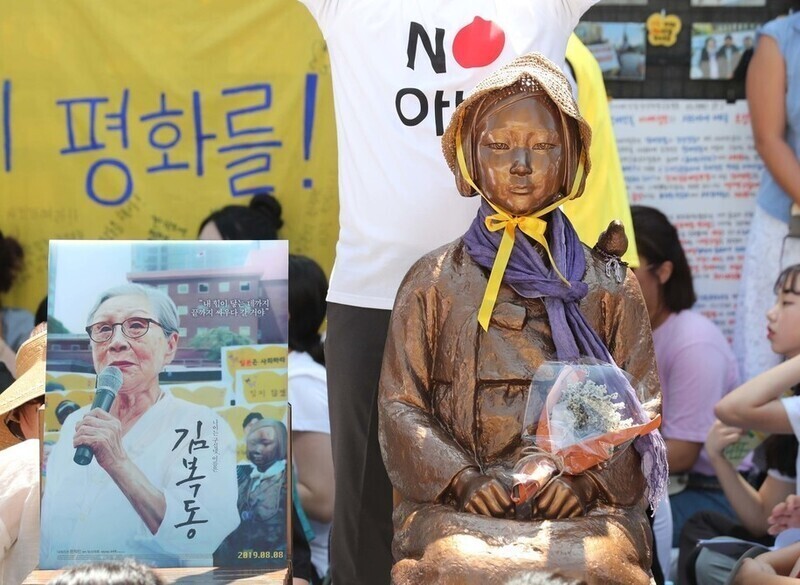hankyoreh
Links to other country sites 다른 나라 사이트 링크
Japan decides to drop “military” from its description of “comfort women” saying it’s more appropriate

The Japanese government has decided that it’s inappropriate to use the terms “comfort women following the army” and “forcible conscription” because of their coercive connotations. The government will replace these terms with “comfort women” and “conscription.” The decision, grounded in arguments made by Japan’s right wing, is likely to apply to elementary, middle, and high school textbooks.
After Nobuyuki Baba, a lawmaker in the House of Representatives from the Japan Innovation Party, complained that the term “comfort women following the army” implies that the women were forcibly mobilized, the Japanese cabinet responded Monday that it would be more appropriate to use the term “comfort women,” Japanese newspaper the Yomiuri Shimbun reported on Wednesday.
The Japanese government stated that using the term “comfort women following the army” — “jugun ianfu” in Japanese — to refer to women drafted into sexual slavery might give rise to misunderstandings.
As a reason for this, it cited the Asahi Shimbun newspaper’s decision to retract a related 2014 article after concluding that accounts by the late Seiji Yoshida — who claimed before his 2000 death that women had been taken from South Korea by force to serve as sexual slaves to the Japanese military — had been false.
But the Asahi Shimbun stated at the time that it had only determined Yoshida’s account to be uncertain, explaining that this did not change the fact that women had been taken to serve as “comfort women” against their will.
The term “jugun ianfu” was also used in the Kono Statement issued in April 1993 by then-Chief Cabinet Secretary Yohei Kono. In his statement, Kono unambiguously acknowledged the use of force in the women’s mobilization and their day-to-day lives.
Japanese right-wingers have applied different forms of force to paper over the use of coercion in the military sexual slavery system. The latest move from the Japanese government effectively signals its agreement.
The Japanese Society for History Textbook Reform, a Japanese right-wing organization, has demanded that the term “jugun ianfu” be removed from textbooks. The term is currently used in some Japanese middle school social studies and high school general history textbooks.
A Japanese government official told the Yomiuri Shimbun that the “cabinet’s decision will be reflected in the next [textbook] authorizations.”
The Korean equivalent to the Japanese term “jugun ianfu” has also been recently shunned in South Korea, too — although for a very different reason than in Japan.
The literal meaning of “jugun” (“jonggun” in Korean) is “to follow the military to the battlefield,” and the term is avoided out of concerns that it could give the mistaken impression that victims of military sexual slavery had “volunteered.”
Instead, the term “Ilbongun wianbu,” or “Japanese military comfort women,” has been used as a way of clearly indicating the Japanese military’s responsibility. UN reports have referred to the Japanese military comfort women as “sexual slaves.”
In another cabinet meeting, the Japanese government decided it was appropriate to use the word “conscription” rather than “forced conscription” or “taking” to refer to workers from the peninsula who were taken and forced to work during the Japanese occupation of Korea.
Experts on the history of the occupation have noted that workers and comfort women were “mobilized” under circumstances where they had no practical right to choose.
By Kim So-youn, staff reporter
Please direct comments or questions to [english@hani.co.kr]

Editorial・opinion
![[Guest essay] Maybe Korea’s rapid population decline is an opportunity, not a crisis [Guest essay] Maybe Korea’s rapid population decline is an opportunity, not a crisis](https://flexible.img.hani.co.kr/flexible/normal/500/300/imgdb/original/2024/0430/9417144634983596.jpg) [Guest essay] Maybe Korea’s rapid population decline is an opportunity, not a crisis
[Guest essay] Maybe Korea’s rapid population decline is an opportunity, not a crisis![[Column] Can Yoon steer diplomacy with Russia, China back on track? [Column] Can Yoon steer diplomacy with Russia, China back on track?](https://flexible.img.hani.co.kr/flexible/normal/500/300/imgdb/original/2024/0430/1617144616798244.jpg) [Column] Can Yoon steer diplomacy with Russia, China back on track?
[Column] Can Yoon steer diplomacy with Russia, China back on track?- [Column] Season 2 of special prosecutor probe may be coming to Korea soon
- [Column] Park Geun-hye déjà vu in Yoon Suk-yeol
- [Editorial] New weight of N. Korea’s nuclear threats makes dialogue all the more urgent
- [Guest essay] The real reason Korea’s new right wants to dub Rhee a founding father
- [Column] ‘Choson’: Is it time we start referring to N. Korea in its own terms?
- [Editorial] Japan’s rewriting of history with Korea has gone too far
- [Column] The president’s questionable capacity for dialogue
- [Column] Are chaebol firms just pizza pies for families to divvy up as they please?
Most viewed articles
- 1Dermatology, plastic surgery drove record medical tourism to Korea in 2023
- 2[Guest essay] Maybe Korea’s rapid population decline is an opportunity, not a crisis
- 3Months and months of overdue wages are pushing migrant workers in Korea into debt
- 4Under conservative chief, Korea’s TRC brands teenage wartime massacre victims as traitors
- 5First meeting between Yoon, Lee in 2 years ends without compromise or agreement
- 6[Column] Can Yoon steer diplomacy with Russia, China back on track?
- 7[Editorial] Japan’s rewriting of history with Korea has gone too far
- 8[Editorial] When the choice is kids or career, Korea will never overcome birth rate woes
- 9[Column] Why Korea’s hard right is fated to lose
- 10Korean research team finds potential link between nanoplastics, obesity